In the current competitive, demanding customer-oriented environment, companies are demanding more of providing faster and more effective services on a very individualized level. The conventional customer support systems, with its enormous dependence on human actors in managing all customer queries, tend to be inadequate in satisfying the demands of contemporary consumers. And this is where automated customer service interactions are used based on AI solutions, giving the businesses an opportunity to enhance service efficiency, minimize operational costs, and improve the process as a whole for the customers.
Artificial Intelligence (AI) has grown at a faster rate to become a vital means to automate most components of customer service. The AI-powered tools, including chatbots, virtual assistants, and predictive analytics assist the companies to provide instant service to their clients faster and more personalized.
What Are AI-Based Solutions for Customer Service?
Customer service AI-based solutions can be described as the technologies employing artificial intelligence to automate, streamline and enhance the work of customer support. One of these solutions includes the use of machine learning, natural language processing (NLP), predictive analytics and speech recognition to automate messages with the customer, handle inquiries and deliver pertinent information to them in real-time.
In contrast to the traditional customer support scenario, which usually involves the presence of human agents to carry out the interaction processes. The AI-based software is able to act autonomously. The software can field customer requests, solve problems. Also, provide customizable support without any human assistance in the process. The intention of these systems is to enhance productivity and minimize human labor, as well as provide on-time, precise, and steady customer service.
Key AI Technologies Behind Customer Service Automation
-
Machine Learning (ML): Enables AI to learn through past encounters and becomes better with their reactions as time progresses.
-
Natural Language Processing (NLP): Helps the AI systems to interpret and process human language in a way that humans can converse with artificial systems naturally.
-
Predictive Analytics: Uses customer data to predict future requirements so it is able to offer support proactively, and recommend suggestions.
-
Speech Recognition: Allows the AI systems to process a spoken language, thus customers could communicate using voice, either via a call center or a voice assistant.
All these technologies in collaboration bring about the development of AI-based solutions that automate many issues revolving around customer support to make it quicker, efficient and personalized.
How AI-Based Solutions Improve Customer Service
The use of AI has many benefits to customer care units. Chats help businesses to offer personalized experiences, they enable 24/7 support and automation of repetitive tasks. Now, it is time to see the main advantages of AI-based automated customer service interactions:
1. Faster Response Times and Increased Efficiency
Among the most prominent benefits of AI-based technologies, the possibility to instantly react to customer requests deserves mentioning. The client will never have to wait; with thousands of telephone calls ongoing, the system will be able to assist thousands of clients. Virtual assistants and chatbots may deliver immediate feedback on common questions (FAQ), order tracking, as well as any general questions drastically cutting down the wait time.
Example: Chatbot powered by AI-based tools on the e-commerce site is able immediately share the information with customers concerning the details of product availability, shipping, or payment facilities without the need to wait in line with the human service representative.
AI enables human agents to prioritize complex problems, as every inquiry and repetitive task will be automated, which increases the efficiency of the entire support team.
2. 24/7 Availability
Customer service solutions powered by AI work all the time to ensure that customers get round-the-clock assistance. Such an availability is important to a business with a global customer base since even during off hours, the customers in different time zones can still be assisted.
Examples: An Asian customer will be able to communicate with a chatbot and solve a problem, even when it is at midnight in the company is currently headquarter in the US. Such availability leads to increased customer satisfaction because the users are not forced to care about the time when they can receive help.
3. Cost Savings
The cost of operation can be drastically cut by implementing the AI-driven systems of customer service. Automation of simple customer service operations enables business enterprises to spend fewer resources in having a large number of customer service personalities, and can thus utilize their limbs in more streamlined ways. Along with that, an AI can process more of the requests annually without having to hire more personnel.
Example: A business, which used to employ 20 agents responding to customer queries, can now downsize the team to 5, since AI would automate 70% of regular requests related to Frequently Asked Questions and order requests. This causes tremendous savings in labor.
4. Personalization and Tailored Support
AI solutions have the capability of offering very individualized support through analyzing the data on customers and approaching them in the manner they prefer, depending on the previous interactions and history of usage. Using the knowledge about the needs and interests of a customer, AI-based systems will be able to suggest some items, services, or content of interest and make the experience more interesting and personalized.
Example: On an e-commerce site, a virtual assistant could recommend products to them based on patterns of viewing products, suggest discounts or deals they are more interested in. Such degree of personalization assists in creating better customer relations and enhances their satisfaction in general.
5. Improved Accuracy and Consistency
AI systems become trained to provide similar answers. So customers will always get correct information when communicating with a chatbot or a virtual assistant. Artificial intelligence-based systems will be able to implement a consistent level of service, which human agents cannot do due to possible variations in their responses.
Example: Customer seeking information regarding a return policy may get one and the same answer notwithstanding the time of the day or the customer care agent he addresses, thus being at a level of consistency making a customer very sure on the point of return policy.
Key AI Tools for Automated Customer Service Interactions
There are several AI tools accessible to companies, which aim at utilizing automated customer service systems. These instruments may be as basic as chatbots or as complicated as virtual assistants and predictive analytics platforms. One of the most popular AI-based solutions to customer service automation is listed below:
| AI Tool | Description |
|---|---|
| Chatbots | Automates answers on frequently asked questions thus making customers save on time. |
| Virtual Assistants | Provides a more customer centred support through context aware and meaningful conversation with customers. |
| Predictive Analytics | Uses data about customers to determine their future behavior and needs to enable a business to provide proactive support. |
| Speech Recognition | Transcribes speech to amounts of data that can be translated into actions, facilitating voice customer service exchanges. |
| Automated Ticketing Systems | Automatically sorts, prioritizes and directs customer service requests to the right teams. |
These tools aid businesses in automating many elements of customer care resulting into quick, efficient and individualized customer support.
Challenges of AI-Based Customer Service Solutions
Although the adoption of AI-based solutions has unparalleled opportunities, companies can face a number of issues when adopting these systems. These are basic problems in the runnings of businesses and possible solutions to such problems:
1. Data Privacy and Security Concerns
To work properly, the AI systems use masses of customer data to become more personal and effective. This increases the doubts on the manner in which the customer data is gathered, stored and employed. To guarantee the trust of their customers, businesses need to make sure they are not breaking data protection laws, including GDPR and CCPA.
Solution: To address privacy-related issues, businesses should implement open data policies, keep customer data safe, and make customers have a say in how their data is processed.
2. Handling Complex Queries
AI-based systems have a high capability of automating the simple tasks; however, they can have difficulties in the cases of complex or subtle customer requests that involve human responses. Customers will get exasperated when they are always referred to AI systems whenever there are challenging or unusual problems.
Solution: The best solution is often a hybrid one where the AI answers routine questions and human agents deal with complex and sensitive cases. This helps in giving fast responses to the customers but the human support is also available in event that they require it.
3. Customer Trust in AI
Communication with AI might be very strange to some of their customers, particularly with sensitive or personal problems. The companies must develop confidence by making themselves clear in the way AI is applied and provide the customer with the chance of upgrading to talk to a human being in case the need.
Solution: When making use of AI-driven systems, businesses must make it apparent that they are using such a system, and give the customers a means of contact in case they need to contact a human agent. The tradeoff between AI and human assistance would be beneficial to establish customer satisfaction and trust.
Real-World Applications of AI-Based Customer Service Solutions
Customer service uses AI Customer service AI solutions are already being adopted by different industries, and this allows them to enhance their operations and provide high-quality customer experience. These are some of the examples of real-world AI applications:
1. E-commerce: Enhancing Shopping Experience
The e-commerce industry was already enjoying the benefits of AI and how businesses are responding to customers. Chatbots based on AI have the ability to quickly assist the customers providing them with an answer to commonly asked questions regarding the availability of products, the status of the orders, the policy of returning the goods, etc. This can make businesses offer a much faster and efficient service and it makes sure that people shop without any problems.
Example: Sephora Company has deployed an AI-driven chatbot, the Sephora Virtual artist that assists its customers in finding the makeup products that suit them and their skin tone. This customized encounter enhances customer satisfaction and also sales.
The other application of AI involves product recommendation whereby a customer is recommended particular products according to his or her browsing history, buying history and preferences. Such a degree of personalization gives rise to the enhanced shopping experience and higher conversion.
2. Telecommunications: Automated Troubleshooting and Support
In telecommunications business AI is being applied in automation of support operations in terms of solving prevalent problems in telecommunications industry such as network connection issues, billing related problems, account reports and handling, etc. Chatbots and virtual assistants with AI are capable of walking customers through troubleshooting guides, respond to any question regarding plans, and even become their technical support.
Example: Vodafone offers a chatbot called TOBi with the ability to help customers resolve account-related questions and answer their technical challenges. TOBi makes the work of the human agents less burdensome by attending to the basic queries and letting the agents deal with the complex ones.
3. Healthcare: Virtual Assistants and Appointment Scheduling
When applied to the healthcare sector, AI-based solutions contribute to streamlining the interactions with patients and making them more accessible. Virtual assistants are able to perform appointment scheduling, give information on symptoms, in addition to refilling prescriptions, and even offer general advice on health matters.
Example: Babylon Health is a digital health service through which patients receive virtual consultations made with the help of AI. Based on symptoms, the AI system evaluates them and gives an opinion or proposes a visit to a medical professional. The given solution can minimize the amount of waiting time and minimize the focus of doctors on less important cases.
4. Financial Services: Personalized Banking and Support
The financial services industry is experiencing profound changes in terms of AI stepping in and automating customer support services and also offering personalised financial advice. Chatbots equipped with AI help customers make a transaction, request balance, detect frauds, and apply for loans.
Example: Erica is a virtual banking assistant developed by Bank of America using artificial intelligence to enable users to manage their money. Erica helps customers to pay bills, make inquiries, budget among others and she will provide them with personalized financial advice depending on their spending pattern.
There is also the application of AI in detecting fraud by comparing customer transaction data in real-time, discovering odd behaviour and reporting the customers or bank executives involved of any possible fraud occurring.
5. Travel and Hospitality: Seamless Booking and Customer Service
Travel and hospitality companies deploy AI to offer real-time support in making the booking, make recommendations based on the individual contexts, and automize customer service. AI chatbots are able to do flights reservation, hotel reservations as well as giving real time updates of the flights.
Examples: KLM Royal Dutch Airlines The air carrier implements AI powered chatbot, BB, helping customers with the flights booking, queries response and current information about the flights, luggage policy, etc. This improves the customer experience as they can be given a quick response and they wait less time.
Emerging Trends in AI-Based Customer Service Solutions
Artificial intelligence is changing the customer service industry at a very high pace. With the development of technology, companies will be able to use even more powerful tools that would help them to improve the interaction with the customers. The following are some of the new trends in customer service powering customer service with AI:
1. AI-Enhanced Multichannel Support
The use of AI is slowly becoming widespread on several customer service platforms, as it is used on websites, mobile apps, social media and voice. Multichannel AI assistance enables companies to create coherent customer experience on any channel thus a customer can be freely helped through any channel since the company can give him or her personal attention based on the need.
Examples: Sprinklr allows using AI on all social media platforms, email and chat and offers businesses to provide personalized support to customers without knowing which platform they are using to get in touch.
2. AI for Predictive Customer Service
The predictive analytics will be enhanced further on making the companies provide the proactive customer service. AI can also predict the demands of the customers based on the history of customers before they contact you. It might include providing a solution that was needed before a person had to seek after it or sending a reminder about an approaching service or subscription renewal.
Example: A telecom company may have AI to judge when a subscriber is likely to lapse because of going offline, impairing service, or need an upgrade, alerting them in advance to avoid complaints.
3. Conversational AI and Voice Assistants
Artificial intelligence-sourced voice assistants will increase as a part of the customer service tools. These voice-based technologies are able to receive queries, help to solve problems and achieve a human undergo, an experience that makes interactions appear more natural and less complex, which is particularly open to customers who have a tendency of using voice communication.
Example: Amazon Alexa and Google assistant already assist the customers to solve their problems and to communicate with services through voice commands. Businesses will incorporate such technology in future in order to provide improved customer services.
4. Emotional Intelligence in AI
Smart systems will get even smarter as they will be able to determine the emotive tone in the voice or even text of a customer. This enables AI to address responses concerning the mood of a customer and offer empathetic sessions and calm down otherwise tense situations.
Example: An AI customer service system has the ability to use sentiment analysis, and once a customer shows frustration, automatically stay the issue to a human agent, who is specifically trained at dealing with complex or sensitive cases.
5. Integration of AI and Automation with CRM Systems
Customer Relationship Management (CRM) systems will be connected with AI-based customer support systems to provide more customized data focused support. AI-powered insights also allow companies to better target the customer since they combine it with customer data.
Example: Salesforce, with Einstein AI included in its CRM system, allows customer support professionals to see the needs and preferences of the customers in real-time to manage customer support more effectively and personalize the interaction.
Summary
With AI-based customer service solutions taking over, the way businesses treat their customers is being transformed in a revolutionary way. Whether it is an AI-powered chatbot dealing with repetitive requests or a virtual assistant to customers who receive more personalized aid, AI is enhancing efficiency, customization, and expansiveness of services directed on a customer. With the increased development of AI technologies, companies should keep up with the trends by adopting these advancements and combating such obstacles like privacy of data, integration, and emotional intelligence.
AI will drive the future of customer service and will give companies a new opportunity to ensure customer satisfaction, minimize operational expenses and offer a consistent, personalized experience across channels.

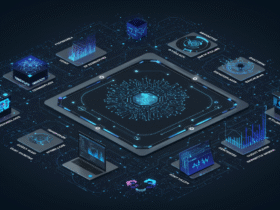
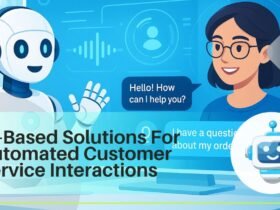










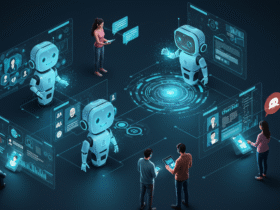


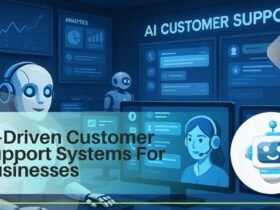

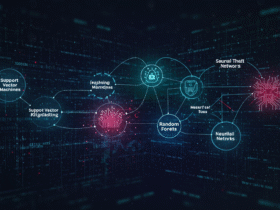







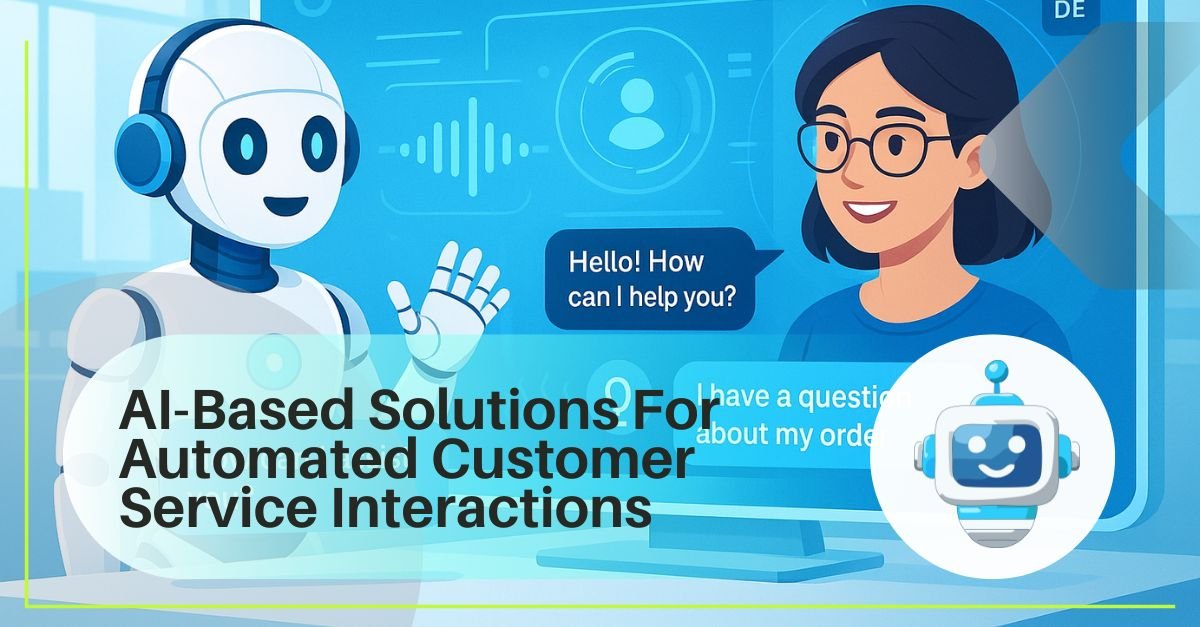


Leave a Reply